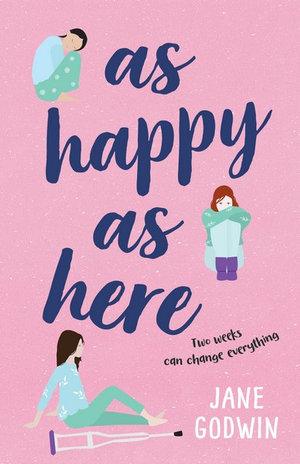Jane Godwin, author of As Happy as Here, answers some questions about her book. We thank her and Fremantle Press for this interview.
The image of the piano sliding towards Evie in the moments before the accident is so dramatic and unusual; did anything specific inspire this unique event?
Not really! I know it is a rather unusual occurrence for a piano to come flying out of a van. I can honestly say that I don’t consciously quite know where that image came from. Except to say that I used to play the piano as a child, and I remember seeing piano-moving vans and thinking that it was a very specific job, moving pianos, and wondering how they were secured, and the intricacies of moving a piano! And sometimes I just imagine odd things happening, I suppose, like if I’m behind a van in traffic and thinking I wonder what would happen if those doors flew open. And it taps into that idea of the utter randomness of some life events: how could one ever predict that a random piano would fly out of a van and hit them!
The girls were able to get to know each other face to face in the hospital ward without the mediation of social media. To what extent do you feel social media influences how young girls’ friendships develop these days?
I think social media has become quite a dark force in the lives of young girls, in fact in the lives of us all! It provides a mouthpiece to anyone regardless of their maturity, motivation, sensitivity or responsibility to other people – quite a dangerous tool for young people who are naturally experimenting with who they are, how they behave and what they believe in. Social media also has no regard for the truth, or for basic fairness. And a young person’s social media footprint will stay with them forever. In the past few years I have seen several instances of online bullying amongst young people I know, sometimes with devastating consequences. And it’s not going to go away, in fact kids who aren’t on social media nowadays tend to lack the social capital to participate. Hopefully as the technology establishes itself more firmly in our culture, people will learn to use it in less destructive ways. I have just finished another novel for this age group that deals more specifically with the perils of social media. Okay, I’ll get off the soapbox now!
How important was it for you to include the sleuthing element?
I’ve always tried to have a strong plot in the novels I’ve written, and this one naturally emerged when I was out walking one morning and I saw someone burying a newspaper in a park up against the fence of a house. It captured my imagination and I kept wondering why they would have done this. The other aspect of this plotline came from when my son suffered a football injury and was immobile and had to stay put for a while and just watch the world outside his window.
Why did you decide to weave Evie’s dreams of the past and foretelling a possible future into the story?
I’m fascinated by Jungian psychology, dreams and the role they play in our conscious thinking and behaviour. We can learn a lot about ourselves and our motivations from our dreams. I think that sometimes we do understand an aspect of our lives in an unconscious way and we may dream about it before we realise anything consciously. Our dreams communicate with our conscious minds in a kind of story world.
Was Jemima a hard character to write?
I didn’t find her harder to write than any other character. I like to create characters the reader may not like initially but who the reader comes to understand and empathise with as the storyprogresses. Jemma is quite annoying, and not always very nice, but her motivations are complex, as she is a complex human being like all of us. I am very fond of Jemma and the resolution of her story was really difficult for me to write. I actually tried to write several different endings to the story, but the natural one for me is the one that I ended up with.
What is good about writing for this age group?
I enjoy writing for many different age groups, but what I like about this age group, say, 12 – 14, is that it’s a time in our lives when we are starting to work out what sort of person we are, who we want to become, and whether our values align exactly with those of our parents and the people we grew up with. It’s a time of closing the door on childhood, which always involves some grieving, and of opening the door to the world as an adult. When we are this age, we exist in a kind of liminal space, before the messy minefield of adolescence really sets in
Read Kay Oddone’s review of As Happy as Here





